Simon Guerrier's Blog, page 27
January 18, 2023
The Return of Faraz Ali, by Aamina Ahmed
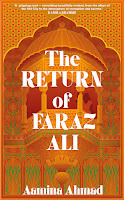 On Monday night I attended the Writers’ Guild of Great Britain Awards 2023, having run the team behind the First Novel Award. Huge congratulations to Aamina Ahmed, who won for her brilliant novel The Return of Faraz Ali.
On Monday night I attended the Writers’ Guild of Great Britain Awards 2023, having run the team behind the First Novel Award. Huge congratulations to Aamina Ahmed, who won for her brilliant novel The Return of Faraz Ali.A police officer is sent to Lahore to cover up the murder of a young girl, and in doing so stirs up all kinds of history — some personal, some family, some national... We were spellbound by this haunting, tragic and beautifully told story.
Also shortlisted for the award were Braver by Deborah Jenkins -
Hazel, suffering from anxiety and OCD, forms an unlikely friendship with Harry, a troubled teen, and Virginia — a church minister facing a crisis. This warm, funny novel is also inspiring and very moving. A delight to read.
- and An Olive Grove in Ends by Moses McKenzie:
Sayon dreams of escaping the “Ends” in Bristol and living in the big house his Mum once pointed out to him — but achieving his dream won’t be easy as he’s just killed someone. A gripping, richly told thriller full of life and character.
And there were lots and lots of very good novels which sadly didn't make the shortlist. Thanks to everyone who submitted novels to the award, and thanks to my amazing fellow judges (Martin Day, Tim Glencross, Merle Nygate, Qaisra Shahraz and Ceriann Taylor) for their hard graft in reading so many books in such a short space of time last year.
January 13, 2023
David Whitaker in an Exciting Adventure with Television
 The lovely lot at Ten Acre Films have officially announced my forthcoming biography of David Whitaker, the original story editor of Doctor Who and a whole lot more besides.
The lovely lot at Ten Acre Films have officially announced my forthcoming biography of David Whitaker, the original story editor of Doctor Who and a whole lot more besides.David Whitaker in an Exciting Adventure with Television will be out in the second half of 2023. More details - a great wealth of more detail - to follow.
The book couldn't have happened without director Chris Chapman employing me as consultant and talking head on the documentary Looking for David, recently released on the Blu-ray collection of Doctor Who's second year of adventures.
I'm also grateful to the team at the official Doctor Who Magazine who've published some of my research into Whitaker and his world. And it all sprang from the research I did for my Black Archive book on The Evil of the Daleks, a 1967 Doctor Who story written by David Whitaker. My book on his 1964 story The Edge of Destruction for the same range will also be out later this year.
January 5, 2023
Doctor Who Magazine #586
 The new issue of the official Doctor Who Magazine boasts an interview with Millie Gibson, who'll be joining the series as companion Ruby Sunday later this year, and the production team behind the new series. So it's a bit of a surprise to see my own gurning head in the midst of the editorial on page 3, where some nice things are said about Looking for David, the documentary about David Whitaker made by Chris Chapman and Toby Hadoke with some consulting and talking by me.
The new issue of the official Doctor Who Magazine boasts an interview with Millie Gibson, who'll be joining the series as companion Ruby Sunday later this year, and the production team behind the new series. So it's a bit of a surprise to see my own gurning head in the midst of the editorial on page 3, where some nice things are said about Looking for David, the documentary about David Whitaker made by Chris Chapman and Toby Hadoke with some consulting and talking by me."Remarkable ... meticulously researched and ultimately poignant."
There's more praise for the documentary in Richard Unwin's review of the Doctor Who: The Collection - Season 2 (the Blu-ray box-set it's part of).
"... nothing short of extraordinary [with] jaw-dropping revelations provided by biographer Simon Guerrier".
So that's nice.
Elsewhere in the magazine, I lavish praise on the new edition of Doctor Who and the Daleks (the first ever Doctor Who novelisation, first published in 1964) which boasts 58 illustrations by Robert Hack and is a delight. I also slip in a couple of new facts about author David Whitaker, too.
Plus, in "No Time to Die", Rhys Williams and I dig into the sets and production of missing 1965 episode The Traitors, with the sets recreated in CGI by Rhys with Gavin Rymill and Anthony Lamb. By chance, yesterday I realised that two elements of The Traitors may originate in something also written by Whitaker - but more on that in due course...
January 4, 2023
Adventures in the Screen Trade, by William Goldman
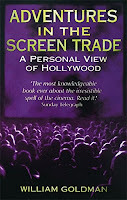 I first read Adventures in the Screen Trade (1983) and its sequel, Which Lie Did I Tell? (2000), around the time I went freelance in 2002, on the recommendation of established writer friends. In those days, I was hungry for advice and hustled round asking questions. One writer recommended the accountant I'm still with, another suggested making a list of all the things I fancied writing so I could gradually tick them off, and someone else prodded me towards Goldman.
I first read Adventures in the Screen Trade (1983) and its sequel, Which Lie Did I Tell? (2000), around the time I went freelance in 2002, on the recommendation of established writer friends. In those days, I was hungry for advice and hustled round asking questions. One writer recommended the accountant I'm still with, another suggested making a list of all the things I fancied writing so I could gradually tick them off, and someone else prodded me towards Goldman.I've now been freelance for more than 20 years, bloodied but unbowed. And it's surprising how much that makes a difference to the text here. Goldman is a brilliant writer -- I only meant to check a detail and ended up being drawn in to read the whole thing. Plus I'm a big fan of his movies (here's a young, green me enthusing about The Ghost and the Darkness).
But what strikes me now is how fearsome Goldman is -- confident yes, his enthusiastic stage directions full of what he admits to as "hype" that no director could realise, but also strongly opinionated about other people and their work. It is waspish, gossipy and good fun, but I wouldn't relish working with Goldman.
I've also got the confidence now to say he's dead wrong about the end of Excalibur (he says Percival not throwing the sword into the lake at the end, as instructed, is a waste of everyone's time rather than a vital part of the legend). He's wrong about the casting of Nanette Newman in The Stepford Wives (far more effective, I think, if the fantasy women are blousy, home-maker, mothering types than the Playboy bunnies Goldman favoured).
"NOBODY KNOWS ANYTHING" he tells us, twice, in capital letters on page 39. But I think I've picked up a few scraps.
The book is full of practical advice that I still find very useful. In sharing his own short story then writing a screen adaptation of it, he asks a series of questions: "What's the story about?", "What's the story really about?", "What about time [ie setting and duration]?", "Who tells the story?", "Where does the story take place?", "What about the characters?" and "What must we cling to?" That all seems obvious, basic stuff -- until he talks through the process of applying them to the story. Following his path, I found myself picking over the paltry bones of an idea I had a while back -- and then filling pages of my notebook with how that might just work.
That's what I got from Goldman, this time and before when I was starting out: a terrific spur.
December 24, 2022
Cinema Limbo: Give My Regards to Broad Street
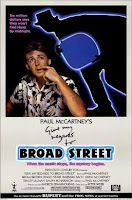 I've once again been a guest on Cinema Limbo, the podcast that picks over odd, old films. In this case, it's Give My Regards to Broad Street, the peculiar musical from Paul McCartney.
I've once again been a guest on Cinema Limbo, the podcast that picks over odd, old films. In this case, it's Give My Regards to Broad Street, the peculiar musical from Paul McCartney.Cinema Limbo: Give My Regards to Broad Street (1984)
Previous episodes with me on them:
Cinema Limbo: The Wicker Man (2006)Cinema Limbo: Smoke (1995)Cinema Limbo: King Kong (1976)Cinema Limbo: Ryan's Daughter (1970)Cinema Limbo: Highlander II - The Quickening (1991)
December 19, 2022
Blake's 7: No Name preview
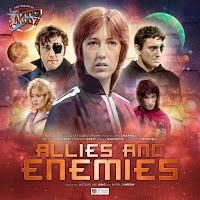 The latest edition of the free Big Finish podcast includes a fair bit on my forthcoming Blake's 7 audio story, No Name.
The latest edition of the free Big Finish podcast includes a fair bit on my forthcoming Blake's 7 audio story, No Name.At 39:25 there are interviews with producer Peter Anghelides, me and actor Brian Croucher about the story. Then, at 1:09:53 you can hear the first 15 minutes of No Name. It's the first I've heard of the episode, and I'm thrilled.
No Name will be released later this month as part of the Allies and Enemies set, alongside stories by Lizbeth Myles and Jonathan Morris.
Blake's 7: No Name by Simon Guerrier
Everyone on Vanstone is hiding something. That’s why they are there. Hiding from her own past, Arlen wonders what has brought Roj Blake to this remote outpost.
Has Arlen uncovered a buried secret? And what does Space Commander Travis want on Vanstone?
Cast:
Sasha Mitchell (Arlen); Brian Croucher (Travis); Victoria Alcock (Mac); Nigel Lindsay (Stor / Lux); Robots (Lisa Bowerman).
Sound design by Naomi Clarke, music by Jamie Robertson, directed by Lisa Bowerman.
December 16, 2022
Cleaning Up on Free Thinking
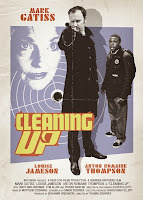 Last night, Radio 3's Free Thinking was on the subject of landladies. The guests included magnificent Louise Jameson, and at 13.40 conversation turned to her role as landlady Mrs Pellman in Cleaning Up, the short film written by me and directed by my brother Tom - which is still available to buy from Big Finish. It's a particular honour to be spoken of alongside the great This Sporting Life (1963), a film that's been much on my mind lately.
Last night, Radio 3's Free Thinking was on the subject of landladies. The guests included magnificent Louise Jameson, and at 13.40 conversation turned to her role as landlady Mrs Pellman in Cleaning Up, the short film written by me and directed by my brother Tom - which is still available to buy from Big Finish. It's a particular honour to be spoken of alongside the great This Sporting Life (1963), a film that's been much on my mind lately. Thanks to presenter Matthew Sweet and producer Torquil MacLeod.
December 6, 2022
WGGB First Novel Award shortlist
The Writers' Guild of Great Britain has announced its 2023 awards shortlist, the winners to be announced at a ceremony on 16 January. As chair of the guild's books committee, I've been running the First Novel Award, and our three shortlisted titles are:
An Olive Grove in Ends by Moses McKenzie
Braver by Deborah Jenkins
The Return of Faraz Ali by Aamina Ahmad
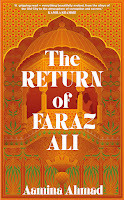

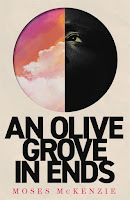
December 3, 2022
Charles Hawtrey 1914-1988 The Man Who Was Private Widdle, by Roger Lewis
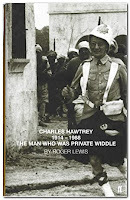 Charles Hawtrey of the Carry On films had an alcoholic cat. It was,
Charles Hawtrey of the Carry On films had an alcoholic cat. It was,“pampered with port-soaked sugar lumps, its bread and butter sprinkled with Cyprus sherry, [and] used to walk into doors and see double when chasing mice.” (pp. 70-71)
This is just one extraordinary, sad and savage anecdote in Roger Lewis's pithy biography. Lewis has been diligent in going through BBC and BFI paperwork and in talking to those who knew Hawtrey in person. As well as the cast and crew of various productions, Lewis spoke to cab drivers, publicans, neighbours, and is good on the gulf between the cheery, cheeky persona captured on film and the angry, lecherous drunk of real life.
Hawtrey's meanness is quite something:
“Of necessity [Lewis claims] he was frugal, penny-pinching. He maintained his account at the Royal Bank of Scotland (Piccadilly branch), because he believed the Scots would keep a beadier eye on their customers’ shillings. He’d lug bags of carrots from Leeds to Kent, because vegetables were cheaper in Yorkshire. He pilfered toilet rolls from public lavatories — or at least his mother did. She was notorious for wiping out supplies at Pinewood and, when rumbled, tried to flush away the incriminating evidence, which blocked the drains, closing down production on Chitty Chitty Bang Bang. Hawtrey was told that in future his mother would have to be locked in his dressing room.” (p. 72)
That's a fantastic a story but I'm not sure it can be true as Chitty Chitty Bang Bang began filming in June 1967 and Wikipedia claims that Hawtrey's mum Alice died in 1965. Lewis doesn't provide a source.
There's lots on money here. Hawtrey and his costars did not get rich from the Carry On films but producer Peter Rogers did. Instead, Hawtrey converted his house in Kew into bedsits — though implied to Roy Castle while making Carry on Up the Khyber in 1968 that he owned a “block of flats”. But Lewis says this enterprise didn't work out, and Hawtrey ended up being “ripped off” (p. 89). He retired to Deal, got banned from all its pubs and finally collapsed in a hotel doorway.
It's a troubled end to a troubled career. Hawtrey “never mixed with the rich and famous” (p. 12), and yet and some notable early roles. As well as playing several women on stage, he understudied Robert Helpmann as Gremio in Tyrone Guthrie’s production of The Merchant of Venice at the Old Vic, the cast including Roger Livsey as Petruchio and, in a small part, the future novelist Robertson Davies. A couple of years later, Hawtrey was in the cast of New Faces, the show that debuted Eric Maschwitz's hit song, “A Nightingale Sang in Berkeley Square.”
But Lewis shares excerpts over three pages from polite, curt rejections from the 1940s and 50s. Then, on page 61, he gives a long list of names at the BBC that Hawtrey wrote to in radio and TV, but concludes that these were,
“all radio or television apparatchiks, and not a single one of these names rings any bells with me” (p. 61n).
In fact, the list includes television pioneer Rudolph Cartier, Cecil McGivern (Controller, then Deputy Director of Television) and Shaun Sutton (later Head of Drama). I recognised various jobbing staff directors from the drama department, and Graeme Muir from light entertainment. So Hawtrey wasn't just writing to “everybody at Broadcasting House, from the Director-General to the janitors”; this is evidence of his range and aspirations — a serious, dramatic actor as well as comic foil.
December 2, 2022
Clips from a Life, by Denis Norden
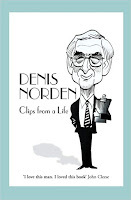 It's been a busy few months running the First Novel Award for the Writers' Guild of Great Britain - the shortlist to be announced shortly. Now I'm back to reading stuff related to my forthcoming biography of David Whitaker, former chair of the Writers' Guild and first story editor of Doctor Who.
It's been a busy few months running the First Novel Award for the Writers' Guild of Great Britain - the shortlist to be announced shortly. Now I'm back to reading stuff related to my forthcoming biography of David Whitaker, former chair of the Writers' Guild and first story editor of Doctor Who.Before that, Whitaker was script editor for Light Entertainment at the BBC, at the same time that Denis Norden and Frank Muir were employed as advisers on comedy. Whitaker then succeeded Norden (and Hazel Adair) as chair of the guild. So I scoured this memoir for any telling detail.
As Norden admits, it's is a rather loose collection of memories, jotted down as they occurred to him and then assembled in rough chronological order. There's a lot on his love of puns and odd turns of phrase, and much of the history is given by anecdote. He doesn't mention Whitaker but provides some fun tales about people in the same orbit - Ted Ray, Eric Maschwitz, Ronnie Waldman, the sitcom Brothers in Law starring Richard Briers and June Barry (Whitaker's first wife), and the early days of the guild.
For example, there's the striking fact that Hazel Adair, co-creator of Compact and Crossroads, who was Norden's co-chair, “at the Guild’s first Awards Dinner opened the dancing with Lew Grade” (p. 281).
Norden's eye for comic detail means there's plenty of vivid, wry observations. I particularly liked this, on the cultures of cinema:
“During the early forties I did some RAF training in Blackpool, where I discovered the cinemas were in the habit of interrupting the main feature sharp at 4 pm every day, regardless of what point in the storyline had been reached, in order to serve afternoon tea. The houselights would go up and trays bearing cups of tea would be passed along the rows. After fifteen minutes, the lights would dim down again, the trays would be passed back and the film wold resume. Anyone unwise enough to be sitting at the end of a row at that point could be left holding stacks of trays and empty cups.” (p. 33)
Simon Guerrier's Blog
- Simon Guerrier's profile
- 60 followers



